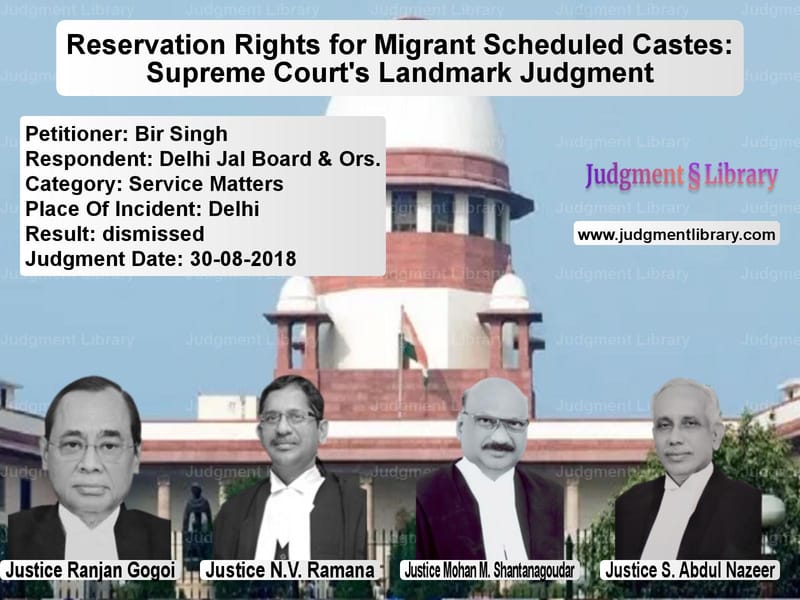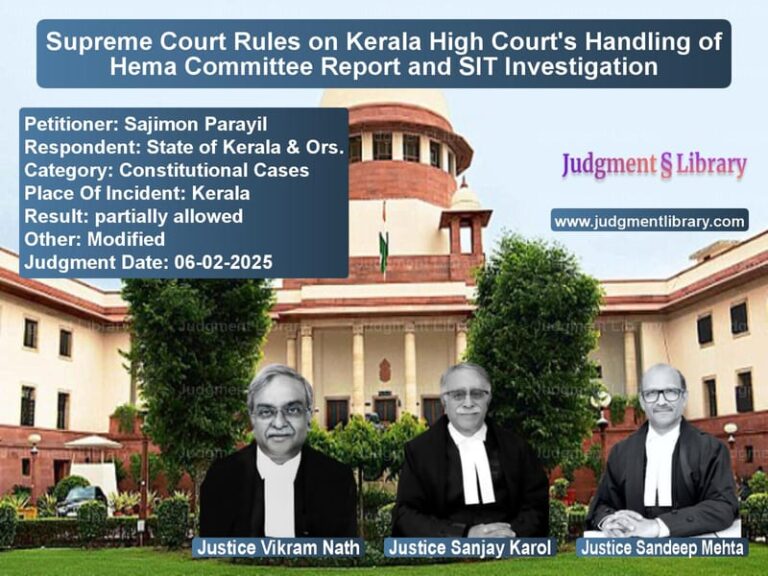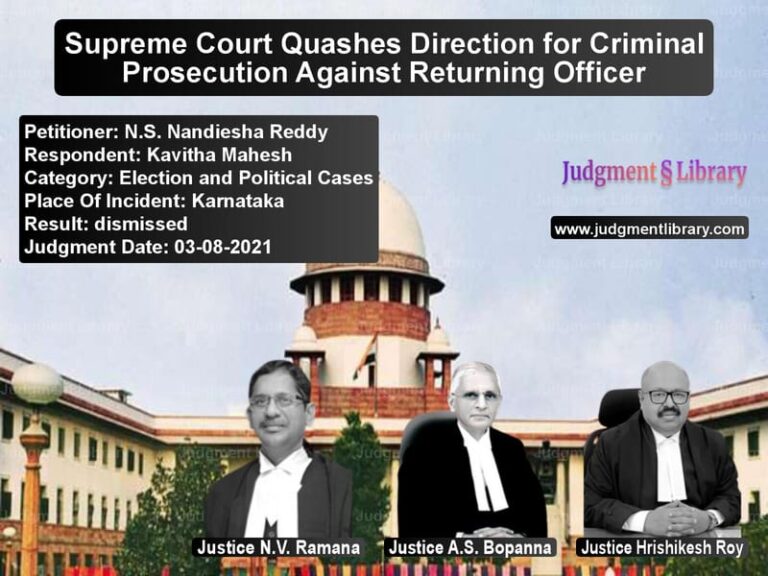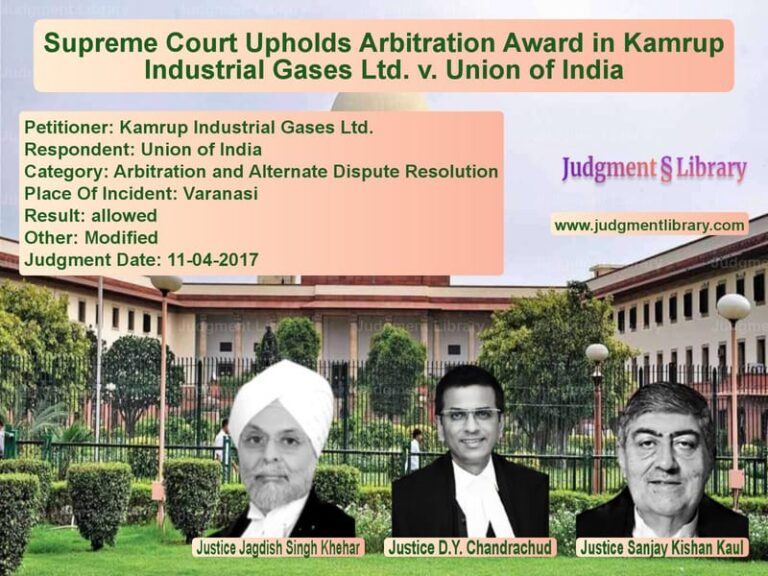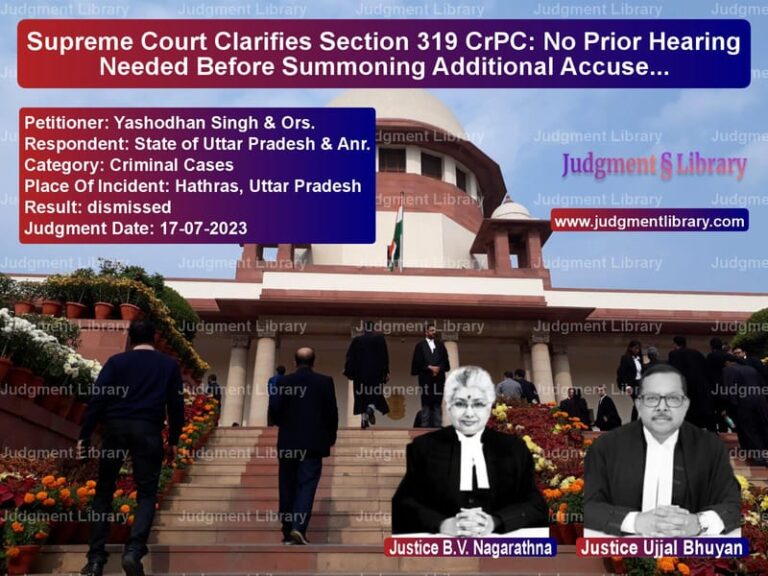Reservation Rights for Migrant Scheduled Castes: Supreme Court’s Landmark Judgment
The Supreme Court in the case of Bir Singh v. Delhi Jal Board & Ors. addressed the important constitutional question regarding the reservation rights of Scheduled Castes (SC) in a State or Union Territory where they have migrated. The core issue revolved around whether a person notified as an SC in one State can claim the same benefits in another State or Union Territory. The judgment clarifies the interplay of Articles 16(4), 341, and 342 of the Indian Constitution.
The Court reiterated the principle laid down in Marri Chandra Shekhar Rao v. Dean, Seth G.S. Medical College and Action Committee on Issue of Caste Certificate, affirming that a person belonging to a Scheduled Caste in one State cannot automatically claim the same status in another State or Union Territory.
Background of the Case
In this appeal, the petitioner, Bir Singh, sought to avail the reservation benefits in employment under the Delhi Jal Board. His claim was based on his Scheduled Caste status from his native State. However, the Delhi Jal Board refused to recognize his caste certificate, arguing that SC status is determined on a state-wise basis as per the Presidential Order.
Petitioner’s Arguments
The petitioner argued that:
- Since he belonged to a Scheduled Caste in his native State, he should be entitled to the same benefits in Delhi.
- Restricting reservation benefits only to those listed under the SC list of Delhi was discriminatory and against the principles of equality under Article 14 of the Constitution.
- The concept of reservation was to uplift the backward communities, and denying him reservation benefits defeated this objective.
Respondent’s Arguments
The respondents contended that:
- The reservation policy is State-specific, and a caste recognized as SC in one State does not automatically get the same recognition in another.
- The Presidential Order under Article 341 clearly specifies SC categories for each State/Union Territory separately.
- Extending reservation benefits to SCs from other States would unfairly reduce the quota available to the local SC population.
Supreme Court’s Analysis
The Court examined previous judgments and the constitutional framework regarding reservations. It cited:
- Marri Chandra Shekhar Rao v. Dean, Seth G.S. Medical College: “A Scheduled Caste person from one State cannot claim reservation benefits in another State unless specifically provided for.”
- Action Committee Case: The Court reinforced that reservation policies should be State-specific to address the unique socio-economic backwardness of communities in each region.
- Subhash Chandra v. Delhi Subordinate Services Selection Board: The Court reiterated that States have the right to provide reservation benefits only to SCs listed for their jurisdiction.
Key Judicial Observations
The judgment, authored by Ranjan Gogoi, N.V. Ramana, Mohan M. Shantanagoudar, and S. Abdul Nazeer, made the following observations:
“A person notified as a Scheduled Caste in State ‘A’ cannot claim the same status in another State on the basis that he is declared as a Scheduled Caste in State ‘A’.”
“It will, therefore, be in consonance with the constitutional scheme to understand the enabling provision under Article 16(4) to be available to provide reservation only to the classes or categories of Scheduled Castes/Scheduled Tribes enumerated in the Presidential orders for a particular State/Union Territory within the geographical area of that State/Union Territory and not beyond.”
Final Judgment
The Supreme Court ruled that:
- The benefit of reservation in employment is applicable only to SCs recognized in the concerned State or Union Territory.
- Union Territories, including Delhi, must follow the reservation lists specified in the Presidential Orders.
- State governments cannot provide reservation benefits beyond what is prescribed in the Presidential Order.
Based on the above reasoning, the Court dismissed the petition and upheld the decision of the Delhi Jal Board.
Impact of the Judgment
This judgment reaffirms the principle that reservation is State-specific and ensures that the benefits are given only to the intended beneficiaries. It prevents dilution of reservation quotas in any State or Union Territory by migrant SC candidates. This ruling also serves as a guideline for future disputes related to reservation in employment and education.
The Court emphasized that while migration does not strip an SC person of their caste status, reservation benefits remain confined to the State where they are recognized as SCs. This ensures that local SC communities are not disadvantaged by the influx of migrant claimants.
Thus, the judgment maintains the constitutional balance in reservation policies and prevents unintended consequences of inter-State migration on affirmative action programs.
Petitioner Name: Bir Singh.Respondent Name: Delhi Jal Board & Ors..Judgment By: Justice Ranjan Gogoi, Justice N.V. Ramana, Justice Mohan M. Shantanagoudar, Justice S. Abdul Nazeer.Place Of Incident: Delhi.Judgment Date: 30-08-2018.
Don’t miss out on the full details! Download the complete judgment in PDF format below and gain valuable insights instantly!
Download Judgment: Bir Singh vs Delhi Jal Board & Or Supreme Court of India Judgment Dated 30-08-2018.pdf
Direct Downlaod Judgment: Direct downlaod this Judgment
See all petitions in Employment Disputes
See all petitions in Recruitment Policies
See all petitions in Public Sector Employees
See all petitions in Judgment by Ranjan Gogoi
See all petitions in Judgment by N.V. Ramana
See all petitions in Judgment by Mohan M. Shantanagoudar
See all petitions in Judgment by S. Abdul Nazeer
See all petitions in dismissed
See all petitions in supreme court of India judgments August 2018
See all petitions in 2018 judgments
See all posts in Service Matters Category
See all allowed petitions in Service Matters Category
See all Dismissed petitions in Service Matters Category
See all partially allowed petitions in Service Matters Category

